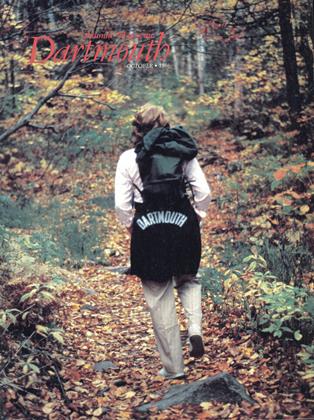In the fall of 1987, the Asian Studies Program will offer Arabic and Hebrew language classes. Initial funding for an assistant professor with a two-year appointment comes from an endowment established by the Andrew W. Mellon Foundation of New York. Professor Gene Garthwaite, chair of Asian Studies, said a search will begin this fall for one person to teach both languages. As Hebrew and Arabic are Semitic languages and closely related, that is not uncommon, he explained.
Hebrew study has a history dating back to the College's earliest years. The second oldest Hebrew grammar book published in the United States was written by a Dartmouth professor in 1803, and Hebrew was a regular part of the College curriculum until this century.
This decade has seen a rekindling of interest by undergraduates in their Judaic heritage. Rabbi Michael Paley, an associate chaplain at the College, says, "People are reawakened to ethnic identities." He went went on to explain that Hebrew is not a just a Jewish subject. Fundamentalist Christians, political science majors with a concentration in the Mideast, and business majors who see Israel as an important trading partner with the United States are among those who have expressed a desire to learn Hebrew.
Gregory Prince Jr., the associate dean of faculty for academic planning and resource development, affirmed the importance of Hebrew and Arabic in a broad liberal arts curriculum and specifically the role they will play in strengthening the West Asia offerings of the Asian Studies Program. Arabic, the native language of about 164 million people, is a major cultural, economic, and commercial force that impinges directly on Asian and Western life. Garthwaite added that the influence of Arabic extends beyond Asia and down into Northern Africa as well.
Four years ago, as a response to the Outside Review Committee recommendation that Dartmouth build a west Asian emphasis to complement its strong east Asian focus on China, the faculty of Arts and Sciences voted to add Hebrew and Arabic. Immediate implementation was not possile because of fiscal concerns. To this end, two fund-raising groups have been formed to raise the $2.5 million endowments for each program. Fund-raising is done under the umbrella of the Dickey Endowment for International Understanding. Chairing the committee for Hebrew and Judaic Studies is Melvin G. Alperin '58. To date the group has raised more than $400,000. Committee chair for the Arabic and Islamic Studies endowment is William Kent, father of Harlan Kent '85. $200,000 has been raised for that effort.
Associate Director of Capital Giving Anne Peyton believes that the interim funding for Hebrew and Arabic is a tremendous boost to the students, faculty, parents, and alumni involved. She is, however, also cautious about the future. "Having begun the languages with interim support which will last only two years, it is even more essential to succeed with the fund-raising effort so students in the future will not be disappointed," she said. At the $2.5 million level, the endowment will fund introductory and advanced study language classes, foreign study/language study abroad, new course offerings in literature, student internships, research projects, conferences, and exchange programs for students and faculty.
Heading overseas is the first contingent of undergraduates selected for internships in PeaceCorps administrative offices around the world. Pictured on their way to a training sessionat Dartmouth, from left to right, are: Florence Burt '88 of Easthampton, Mass.; MaryHoult 88 of Wellesley, Mass.; Michael Wilner '88 of Hastings-on-Hudson, N.Y.; AmyKKessel '88 of Marblehead, Mass.; India Wood '88 of Colorado Springs, Colo.; and LewisGreenstein, educational consultant to the Peace Corps.
 View Full Issue
View Full Issue
More From This Issue
-
 Feature
FeatureBONFIRE!
October 1986 By Shelby Grantham -
 Feature
FeaturePapa's Son
October 1986 By Everett Wood '38 -
 Feature
FeatureA China Perspective
October 1986 By President David T. McLaughlin '54 -
 Article
ArticleDartmouth Authors
October 1986 By C. E. Widmayer -
 Article
ArticleCarl Thum: Teacher of how to learn
October 1986 By Georgia Croft -
 Sports
SportsThe Key to Defense
October 1986 By Jim Neeciham '70







